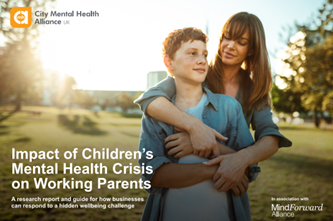A YouGov survey of over 1,000 parents, commissioned by the CMHA in partnership with Morgan Stanley and PwC, revealed that more than two-thirds (68%) of parents have been concerned about their children’s mental health in the past two years. This is impacting parents in many aspects of their life. And this is having a knock-on effect, with 60% of those parents saying that concerns about their children were impacting their own mental health; 37% said they had difficulty sleeping; and 20% said they were withdrawing from social situations.
65% of working parents who were concerned also told us that it had impacted them at work in some way, including:
- 31% said it had made the stresses of their job harder to manage
- 24% said that they felt they had not been performing their best in their job
- 12% of concerned working parents had considered reducing their working hours to support their child(ren)
- 8% had considered quitting their jobs altogether.
These statistics demonstrate the ongoing impact that poor mental health can have on individuals and business. However, the research also pointed to the positive and practical role that businesses can play in supporting working parents, with 66% of all working parents saying that they would like their employer to support them if their child was struggling with mental health. Areas that parents would like to have support on include flexibility in ways of working; compassion and understanding from line managers; mental health literacy training; and resources that would help support the mental health of themselves and their children (e.g. counsellors and mental health insurance).
“Study after study has made it clear that our country is facing a crisis in children’s mental health, which is incredibly sad and a challenge for all of us. This report shines a clear life on how this crisis is impacting the lives of hundreds and thousands of parents and carers. It helps us to better understand exactly what this impact is, particularly in the context of working parents. And, importantly, explore what businesses can do to help.”
Alison Unsted, CEO of CMHA UK said,
“At the City Mental Health Alliance, we strongly believe workplaces have a responsibility and an opportunity to actively support and protect the positive mental health of all their people. This includes the many thousands of working parents who are working to balance the challenge of supporting their child(ren) and doing well at work. The pandemic made it crystal clear that one way in which businesses can support the mental health of employees is by recognising that their family and work priorities can overlap and, at times, will clash. Today we are asking businesses to recognise, understand and act with compassion to help support parents’ mental health, manage the overlapping demands and taking the opportunity to provide support that contributes to children’s recovery.”
The concerns shared by parents demonstrates the wide range of challenges that children and young people are facing: 50% said they were concerned about their child having general anxiety; 38% about consistent low mood; 20% about eating disorders; and very concerningly, 12% were worried about suicidal thoughts in their children - 4% because their child had attempted suicide. 44% of parents have had concerns about the mental health of more than one of their children.
The CMHA is grateful to Morgan Stanley and PwC for their enormous support on this research, and for helping to shape the very practical recommendations for business. Thanks also to Place2Be, Young Minds and the Pears Maudsley Centre for Children for their continued insight and support.
To find out more about the research and guidance and examples for how businesses can support working parents who are concerned about their children, download the guide.





